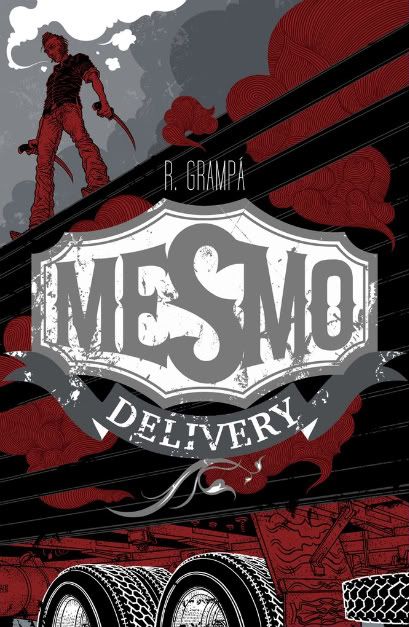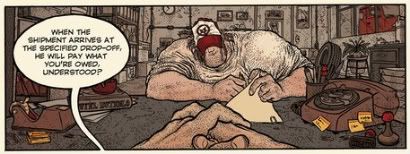Short post for a short book.
Mesmo Delivery

This book isn't quite out yet. As a matter of fact, it hasn't been out for a few months now, if you're going by comics stores, but that hasn't stopped word from buzzing around since its San Diego show debut. It's a 56-page, $12.50 softcover release from AdHouse, and the first-ever solo book by Brazilian illustrator-designer-animator Rafael Grampá. It should be active in the Direct Market soon.
I first noticed Grampá's work in the 2005 Terra Major anthology Gunned Down -- an all-Brazil, western-as-in-cowboys project that also provided an early look at Fábio Moon & Gabriel Bá -- and I was pretty surprised to find out it was actually his comics debut. He also took part in the Eisner-winning jam minicomic 5 (with Moon, Bá, Becky Cloonan and Vasilis Lolos), and he'll be teaming with Brian Azzarello for a short piece in the upcoming Hellblazer #250. He's currently working on a six-part series titled Furry Water, with writer Daniel Pellizzari, so yeah - you'll be seeing more of him in the future.
But right now, you'll want to check out this preview. Yes, I know it's a pdf, but it's important you see a big stack of the art, because I don't think you're going you're going get much out of this book if you don't respond to Grampá's visuals. It's a simple, direct piece -- even its twists are straight ones, and nary a word is spoken that doesn't mean exactly what is said -- so as to best conduct the impact of the artist's puffy, curling bodies, gnarled faces and popping gushes of blood, all of it in colors (created with Marcus Penna) that look like rust with a day's worth of dirt blown over it.
You might call this comic a 'pop song.' Or a 'style fart' (term coined by the good Abhay Khosla, Esq.) if you don't like it. Just to keep the music analogy going.
If it's going to be a pop song, I suspect it's meant to be sort of an old-timey country doom ballad about the devil right beside ya; the plot sees ex-boxer, man-mountain and general hard man Rufo driving a big truck on a long haul down a dusty road, in the company of a cackling Elvis fanatic named Sangrecco. He stops at a bar, takes a piss, orders a milk (yep), catches the eye of the municipal welcome wagon, and deep-fried trouble soon begins, with truly diabolical developments to follow.
And while it is a little odd when one of the local heroes literally pops off his hand to replace it with a spare fist as big as his torso -- I guess there's some sort of special production to this down-home tune, though I never know how best to work these music comparisons -- it's also never really jarring, as all the world is subject to Grampá's overpowering visual aesthetic, flattening out all that mannered he-man open road grit and unreal flourish like a good punch laying a guy out.

I liked it all fine enough. Grampá's tactile, caricatured human forms and goopy bloodshed bring to mind Geof Darrow, and while the younger artist doesn't quite manage the maniacal control/perversion of pace and perspective on display in Shaolin Cowboy -- to say nothing of the playfully obsessive hyper-detail of Hard Boiled -- he does seem to grasp the latent humor to this sort of crazy candy action style, a sense of play that's sometimes missing from the work of, say, Juan José Ryp.
So, when Grampá has a character stick a beer bottle's neck in someone's eye socket and pop the cap, both cap and eye fly off at just the right skewed angle, with about enough of a white and yellow pain spike and a sufficiently po-faced "PLUC" sound effect to indicate the joy he had in crafting that special panel, and that's what matters. Little dabs of energy abound, like the use of wordless, solid color dialogue bubbles, or jagged song lyrics that swirl around a character that loves the stuff.
Sometimes the artist pushes it a bit far for my taste, like when little Fleischer Brothers-type cartoons surround a knocked-down Rufo in a b&w vision. The story (terse English dialogue by Ivan Brandon) seems a bit more pleased with its own cleverness than is warranted; when everything is this on-the-surface -- black crows grabbing teeth in their beaks and all that -- dropping in a three-part revelatory flashback construct seems like gilding the lily. Better for this thing to steam forward, deep into decadent action.
After all, Grampá has cited Brazilian filmmaker José Mojica Marins' famed Coffin Joe character as influential - Marins is the father of Brazil's horror cinema, and Coffin Joe is a uniquely charismatic villain, disdainful of religion and superstition while obsessed with progeny and human perfection, a monster star given to some excess of a sour logic. You can definitely catch a whiff of his presence in the amoral glee that hovers over this book's murders, and while Grampá pretty much skips that slippery human element, he is skilled enough to cohere his comic art into a world that accommodates the pleasure in wickedness.
Whether you want to see that world is an easy matter: just look with your eyes. Those pictures are all any comic ultimately is, I suppose, but in a comic like this they'll include most of the detail along with your first blush. You'll know what more you'll want to know.

This book isn't quite out yet. As a matter of fact, it hasn't been out for a few months now, if you're going by comics stores, but that hasn't stopped word from buzzing around since its San Diego show debut. It's a 56-page, $12.50 softcover release from AdHouse, and the first-ever solo book by Brazilian illustrator-designer-animator Rafael Grampá. It should be active in the Direct Market soon.
I first noticed Grampá's work in the 2005 Terra Major anthology Gunned Down -- an all-Brazil, western-as-in-cowboys project that also provided an early look at Fábio Moon & Gabriel Bá -- and I was pretty surprised to find out it was actually his comics debut. He also took part in the Eisner-winning jam minicomic 5 (with Moon, Bá, Becky Cloonan and Vasilis Lolos), and he'll be teaming with Brian Azzarello for a short piece in the upcoming Hellblazer #250. He's currently working on a six-part series titled Furry Water, with writer Daniel Pellizzari, so yeah - you'll be seeing more of him in the future.
But right now, you'll want to check out this preview. Yes, I know it's a pdf, but it's important you see a big stack of the art, because I don't think you're going you're going get much out of this book if you don't respond to Grampá's visuals. It's a simple, direct piece -- even its twists are straight ones, and nary a word is spoken that doesn't mean exactly what is said -- so as to best conduct the impact of the artist's puffy, curling bodies, gnarled faces and popping gushes of blood, all of it in colors (created with Marcus Penna) that look like rust with a day's worth of dirt blown over it.
You might call this comic a 'pop song.' Or a 'style fart' (term coined by the good Abhay Khosla, Esq.) if you don't like it. Just to keep the music analogy going.
If it's going to be a pop song, I suspect it's meant to be sort of an old-timey country doom ballad about the devil right beside ya; the plot sees ex-boxer, man-mountain and general hard man Rufo driving a big truck on a long haul down a dusty road, in the company of a cackling Elvis fanatic named Sangrecco. He stops at a bar, takes a piss, orders a milk (yep), catches the eye of the municipal welcome wagon, and deep-fried trouble soon begins, with truly diabolical developments to follow.
And while it is a little odd when one of the local heroes literally pops off his hand to replace it with a spare fist as big as his torso -- I guess there's some sort of special production to this down-home tune, though I never know how best to work these music comparisons -- it's also never really jarring, as all the world is subject to Grampá's overpowering visual aesthetic, flattening out all that mannered he-man open road grit and unreal flourish like a good punch laying a guy out.

I liked it all fine enough. Grampá's tactile, caricatured human forms and goopy bloodshed bring to mind Geof Darrow, and while the younger artist doesn't quite manage the maniacal control/perversion of pace and perspective on display in Shaolin Cowboy -- to say nothing of the playfully obsessive hyper-detail of Hard Boiled -- he does seem to grasp the latent humor to this sort of crazy candy action style, a sense of play that's sometimes missing from the work of, say, Juan José Ryp.
So, when Grampá has a character stick a beer bottle's neck in someone's eye socket and pop the cap, both cap and eye fly off at just the right skewed angle, with about enough of a white and yellow pain spike and a sufficiently po-faced "PLUC" sound effect to indicate the joy he had in crafting that special panel, and that's what matters. Little dabs of energy abound, like the use of wordless, solid color dialogue bubbles, or jagged song lyrics that swirl around a character that loves the stuff.
Sometimes the artist pushes it a bit far for my taste, like when little Fleischer Brothers-type cartoons surround a knocked-down Rufo in a b&w vision. The story (terse English dialogue by Ivan Brandon) seems a bit more pleased with its own cleverness than is warranted; when everything is this on-the-surface -- black crows grabbing teeth in their beaks and all that -- dropping in a three-part revelatory flashback construct seems like gilding the lily. Better for this thing to steam forward, deep into decadent action.
After all, Grampá has cited Brazilian filmmaker José Mojica Marins' famed Coffin Joe character as influential - Marins is the father of Brazil's horror cinema, and Coffin Joe is a uniquely charismatic villain, disdainful of religion and superstition while obsessed with progeny and human perfection, a monster star given to some excess of a sour logic. You can definitely catch a whiff of his presence in the amoral glee that hovers over this book's murders, and while Grampá pretty much skips that slippery human element, he is skilled enough to cohere his comic art into a world that accommodates the pleasure in wickedness.
Whether you want to see that world is an easy matter: just look with your eyes. Those pictures are all any comic ultimately is, I suppose, but in a comic like this they'll include most of the detail along with your first blush. You'll know what more you'll want to know.

<< Home